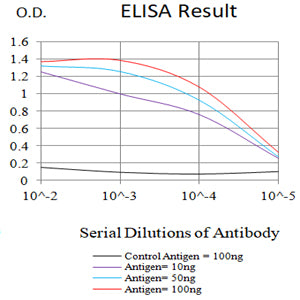
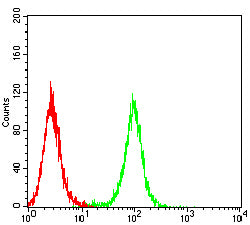
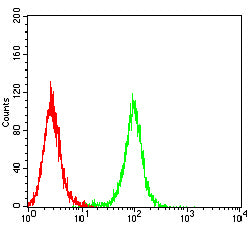
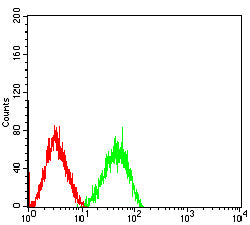
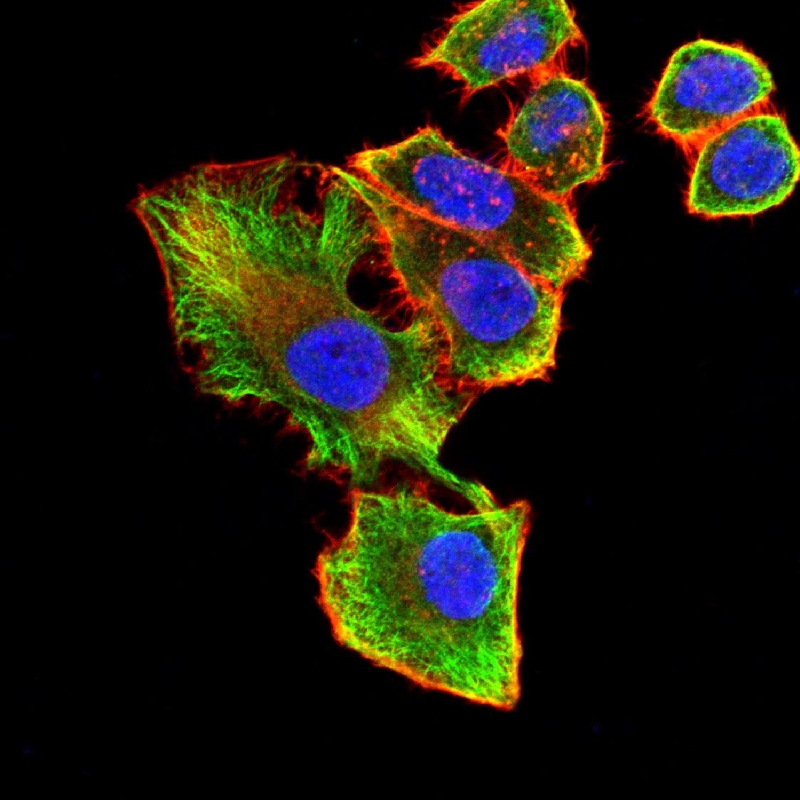
| WB | 咨询技术 | Human,Mouse,Rat |
| IF | 咨询技术 | Human,Mouse,Rat |
| IHC | 咨询技术 | Human,Mouse,Rat |
| ICC | 1/200 - 1/1000 | Human,Mouse,Rat |
| FCM | 1/200 - 1/400 | Human,Mouse,Rat |
| Elisa | 1/10000 | Human,Mouse,Rat |
| Aliases | COX2; COX-2; PHS-2; PGG/HS; PGHS-2; hCox-2; GRIPGHS |
| Entrez GeneID | 5743 |
| clone | 4C1H7 |
| WB Predicted band size | 69kDa |
| Host/Isotype | Mouse IgG1 |
| Antibody Type | Primary antibody |
| Storage | Store at 4°C short term. Aliquot and store at -20°C long term. Avoid freeze/thaw cycles. |
| Species Reactivity | Human |
| Immunogen | Purified recombinant fragment of human PTGS2 (AA: 18-207) expressed in E. Coli. |
| Formulation | Purified antibody in PBS with 0.05% sodium azide |
+ +
以下是3-4条关于PTGS2(COX-2)抗体的参考文献及其摘要概括:
---
1. **文献名称**: *"Selective inhibition of COX-2 by monoclonal antibodies: a therapeutic advance in inflammation and cancer"*
**作者**: Smith WL, et al.
**摘要**: 该研究开发了特异性靶向PTGS2的单克隆抗体,验证了其在抑制炎症反应中的效果,并探讨了其通过阻断COX-2活性减少肿瘤生长的潜在机制,为癌症治疗提供新策略。
2. **文献名称**: *"Immunohistochemical localization of COX-2 in human colorectal cancer using a novel PTGS2-specific antibody"*
**作者**: Dubois RN, et al.
**摘要**: 通过新型PTGS2抗体的免疫组化分析,发现COX-2在结直肠癌组织中高表达,且与肿瘤侵袭性和预后不良相关,支持COX-2作为癌症诊断标志物的价值。
3. **文献名称**: *"Characterization of a high-affinity anti-PTGS2 antibody for targeted molecular imaging of inflammation"*
**作者**: FitzGerald GA, et al.
**摘要**: 研究报道了一种高亲和力PTGS2抗体,结合分子影像技术成功在小鼠炎症模型中可视化COX-2活性,证明其在实时监测炎症性疾病中的应用潜力。
4. **文献名称**: *"PTGS2 antibody-based detection of COX-2 isoforms in neurodegenerative disease models"*
**作者**: Minghetti L, et al.
**摘要**: 利用特异性PTGS2抗体分析阿尔茨海默病模型脑组织,发现COX-2异常表达与神经炎症和神经元损伤相关,为神经退行性疾病机制研究提供依据。
---
这些文献涵盖了PTGS2抗体在疾病机制研究、诊断工具开发及靶向治疗中的应用。
PTGS2 (prostaglandin-endoperoxide synthase 2), also known as cyclooxygenase-2 (COX-2), is an inducible enzyme that plays a critical role in inflammation, pain signaling, and cellular proliferation. It catalyzes the conversion of arachidonic acid to prostaglandin H2. a precursor for pro-inflammatory mediators like prostaglandin E2. Unlike its constitutively expressed isoform PTGS1 (COX-1), PTGS2 is typically undetectable in most tissues under normal conditions but is rapidly upregulated by cytokines, growth factors, or oncogenic stimuli. This makes PTGS2 a key biomarker and therapeutic target in inflammatory diseases (e.g., rheumatoid arthritis), cancer, and neurodegenerative disorders. Overexpression of PTGS2 is linked to tumor progression, angiogenesis, and resistance to apoptosis in various cancers, including colorectal and breast cancer.
PTGS2 antibodies are widely used in research and diagnostics to detect PTGS2 expression in tissues or cell lines, aiding in studies of its regulatory mechanisms and pathological roles. They are essential tools for immunohistochemistry, Western blotting, and ELISA to evaluate PTGS2 levels in disease models or clinical samples. In therapeutics, PTGS2-targeting monoclonal antibodies (though less common than small-molecule inhibitors like NSAIDs or COX-2-selective drugs) have been explored for anti-inflammatory and anti-cancer applications. However, challenges remain, including balancing efficacy with cardiovascular or gastrointestinal side effects associated with PTGS2 modulation. Recent studies also investigate PTGS2's role in immune microenvironment regulation, expanding its relevance in immunotherapy and precision medicine.
×